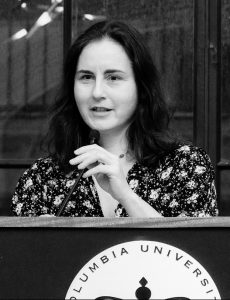
Lectures, Lunch Lectures, News
Danielle Spencer
Academic Director, Narrative Medicine Program Columbia University, New York
May 24, 2022, 12-1 p.m., 02.102 (Philo II)
This talk offers an introduction to Narrative Medicine, as well as the concept of metagnosis as the revelation of a longstanding condition. This can occur when an individual is diagnosed with a condition such as ADHD or Asperger Syndrome which was previously present, but undiagnosed; it can also happen when diagnostic boundaries shift. How do these experiences change our knowledge? We will also discuss broader applications of the concept, and ways in which it illuminates the principles and practices of Narrative Medicine.
www.daniellespencer.com/metagnosis
Danielle Spencer is the author of Metagnosis: Revelatory Narratives of Health and Identity (Oxford University Press, 2021) and co-author of Perkins- Prize-winning The Principles and Practice of Narrative Medicine (OUP, 2017). Her research interests include retrospective diagnosis, contemporary film and bioethics, and healthcare pedagogy; her creative and scholarly work appears in diverse outlets, from Ploughshares to The Lancet. Formerly artist/musician David Byrne’s Art Director, Spencer holds a B.A. from Yale University, an M.S. in Narrative Medicine from Columbia University, and a Ph.D. from Johannes Gutenberg University, Mainz. She is a 2019 MacDowell Fellow and a 2022 Yaddo Fellow.
You can download the poster for this talk here.

Lectures, Lunch Lectures, News
Scott Obernesser (University of Mississippi)
January 31, 2019, 12-1 p.m., 02.102 (Philo II)
“‘Road Trippin:’ Twentieth-Century American Road Narratives and Petrocultures from On The Road to The Road” examines late-twentieth century U.S. road narratives in an effort to trace the development of American petrocultures geographically and culturally in the decades after World War II. The highway stories that gain popularity throughout the era trace not simply how Americans utilize oil, but how the postwar American oil ethos in literature, film, and music acts upon and shapes human interiority and vice versa. Roads and highways frame my critique because they are at once networks of commerce transportation and producers of a unique, romantic national mythos that impacts American literary and extra-literary textuality throughout the late-twentieth century. My methodology draws on literary, environmental, and material culture studies, but rather than dwell on the substance itself, the project traces oil’s presence in the aesthetic stuff of our lives: the novels, films, television shows, popular songs, and memoirs that structure conceptions of individualism, freedom, mobility, race, gender, and sexuality. In doing so, I rely heavily upon interdisciplinary lenses derived from literary, film, and affect theories. Petroaffect, or the ways in which oil and oil culture shape and reshape human interiority, reveals how people are in a sense manufactured by oil as psychological or even spiritual beings. Tracing petroculture’s trajectory throughout late-twentieth century road narratives—road novels, outlaw trucker movies, popular music, memoir, and apocalyptic fictions—demonstrates that oil’s material, ideological, and environmental effects and affects are vital to the formation of the petromodern American.
Scott Obernesser received his PhD in English Literature from the University of Mississippi, specializing in Environmental and Southern Literatures. Scott is currently a visiting lecturer at the Obama Institute for Transnational American Studies at JGU Mainz.
You can download the poster for this talk here.

Lectures, Lunch Lectures, News
Danielle Spencer (Columbia University)
January 22, 2019, 12-2 p.m. 02-709 Georg-Forster Gebäude
 In this project I “diagnose” a phenomenon I term discovering difference: the experience of newly learning in adulthood that one has a longstanding cognitive or perceptual difference from the norm, particularly one that may be considered pathological. It can occur when the condition has remained undetected, such as becoming aware that one is colorblind, and/or when the diagnostic categories themselves have shifted, as with the emergence of autism spectrum disorders or ADHD. This phenomenon has received relatively scant attention, yet learning of an unknown condition is frequently a significant and bewildering revelation, subverting narrative expectations and customary categories. In addressing the topic I articulate and deploy an evolution of narrative medicine as a robust research methodology comprising interdisciplinarity, narrative attentiveness, and creating a writerly text. Beginning with my own experience of discovering difference, I explore the issues it raises—from communicability to narrative intelligibility to different ways of seeing. Next, I map the phenomenon’s distinctive narrative arc through the stages of recognition, subversion, and renegotiation, and finally discuss this trajectory in light of others’ experiences. I propose that interdisciplinary understanding as well as the figure of blindsight—drawn from my own experience—offers a productive model for negotiating such revelations and for holding different forms of knowledge in generative tension. Better understanding discovering difference will aid those directly affected; moreover, it serves as a bellwether for how we will all navigate advancing biomedical and genomic knowledge, and how we may integrate medico-scientific revelations with what we understand to be our identities.
In this project I “diagnose” a phenomenon I term discovering difference: the experience of newly learning in adulthood that one has a longstanding cognitive or perceptual difference from the norm, particularly one that may be considered pathological. It can occur when the condition has remained undetected, such as becoming aware that one is colorblind, and/or when the diagnostic categories themselves have shifted, as with the emergence of autism spectrum disorders or ADHD. This phenomenon has received relatively scant attention, yet learning of an unknown condition is frequently a significant and bewildering revelation, subverting narrative expectations and customary categories. In addressing the topic I articulate and deploy an evolution of narrative medicine as a robust research methodology comprising interdisciplinarity, narrative attentiveness, and creating a writerly text. Beginning with my own experience of discovering difference, I explore the issues it raises—from communicability to narrative intelligibility to different ways of seeing. Next, I map the phenomenon’s distinctive narrative arc through the stages of recognition, subversion, and renegotiation, and finally discuss this trajectory in light of others’ experiences. I propose that interdisciplinary understanding as well as the figure of blindsight—drawn from my own experience—offers a productive model for negotiating such revelations and for holding different forms of knowledge in generative tension. Better understanding discovering difference will aid those directly affected; moreover, it serves as a bellwether for how we will all navigate advancing biomedical and genomic knowledge, and how we may integrate medico-scientific revelations with what we understand to be our identities.
Danielle Spencer is a faculty member of the Program in Narrative Medicine at Columbia University. She is a co-author of The Principles and Practice of Narrative Medicine (Oxford University Press, 2017) and her work appears in a range of outlets, from Ploughshares to The Lancet. Her research interests include the intersection between narrative, identity, and diagnosis; bioethics and speculative fiction, and healthcare professions pedagogy. Spencer worked as artist/musician David Byrne’s Art Director for many years, collaborating on and exhibiting a range of projects, as well as with photographer Nan Goldin. She holds a B.A. from Yale University and an M.S. in Narrative Medicine from Columbia University, and a Ph.D. des. in American Studies at Johannes Gutenberg University Mainz.
You can download the poster for this talk here.

Lectures, Lunch Lectures, News
Sophia L. Bamert (University of California, Davis)
January 24, 2019, 12-1 p.m., 02.102 (Philo II)
In 1915, sociologist Robert E. Park described the modern city as “a mosaic of little worlds which touch but do not interpenetrate,” a spatial—and racial—imaginary that had already been expressed in Jacob Riis’s portrayal of the Lower East Side as an “extraordinary crazy-quilt” of ethnic immigrant groups in his 1890 exposé How the Other Half Lives and that was reinforced in the 1930s by the Home Owners’ Loan Corporation “redlining” maps. My research considers how the entanglements of geographic imaginaries and material conditions serve to racialize urban space, emphasizing the role of narrative in both upholding and homogenizing geographic representations but also in critiquing those representations by revealing the very narrativity of their construction. I focus on Chicago in the early twentieth century, where the “Chicago School” sociologists taught literature as a window into the urban psyche and interacted with local authors such as Richard Wright. This was, significantly, a moment at which Chicago was America’s most iconic and rapidly growing city, a period during which the intersecting histories of American urbanism, immigration, and the Great Migration also laid the groundwork for the city’s notorious—and still existent—segregation. Bringing together narratology and cultural geography, my talk will theorize the relationship between narrative mapping and racialized space by bringing together turn-of-the century realist novels (Henry Blake Fuller’s The Cliff-Dwellers and Theodore Dreiser’s Sister Carrie) with Chicago Black Renaissance short fiction (Marita Bonner’s Frye Street stories).
Sophia Bamert is a PhD candidate in English with a designated emphasis in Writing, Rhetoric, and Composition Studies at the University of California, Davis. She holds a BA in English and Environmental Studies from Oberlin College and an MA in English from UC Davis. Sophia is currently a visiting lecturer at the Obama Institute for Transnational American Studies at JGU Mainz.
You can download the poster for this talk here.

Lectures, Lunch Lectures, News
Vanessa Evans (York University, Canada)
December 13, 2018, 12-1 p.m., 02.102 (Philo II)
Too often, the pull of the policy audience has resulted in decolonization being enlisted as a hollow metaphor that seeks to reconcile settler complicity and secure settler futurity. This seduction has immense consequences for the substance, style, and politics of research in Indigenous studies. As such, the field of Indigenous literary study cannot blindly adopt the agendas of those making or administering policy. I advocate that a primary impediment to an increased consciousness about Indigeneity lies in how we study the contemporary literature of Indigenous peoples. This requires a reconceptualization of Indigeneity away from its boundedness to specific lands and pasts that valorize ties to first contact, instead embracing the reality that Indigenous peoples are a contemporary presence throughout the world. In response to this reimagining, my research investigates: (i) how the study of Indigenous world literatures might destabilize characterizations of absence that isolate Indigenous peoples to particular places and pasts, and (ii) how these literatures can entrench Indigenous presence as planetary phenomenon. I make this intervention by modeling a cosmic methodology that recognizes Indigeneity and Indigenous peoples as omnipresent and thriving; it is, at its heart, a project that contributes to the ongoing work of decolonizing literary study itself through the minds of those who study and teach literature.
Vanessa Evans is a doctoral candidate in the Department of English at York University. She holds a B.A. in English from the University of Calgary and an M.Litt. in Modernities from the University of Glasgow. Vanessa is currently a visiting lecturer at the Obama Institute for Transnational American Studies at JGU Mainz.
You can download the poster for this talk here.

Lectures, Lunch Lectures, News
Scott P. King (Shenandoah University, USA)
June 21, 2018, 1-2.30 p.m., 02.102 (Philo II)
Sister Jean Dolores-Schmidt, a 98-year-old nun and team chaplain for Loyola University Chicago, became a sensation in both social and traditional media during her school’s underdog run to the 2018 USA collegiate men’s basketball tournament semifinals. In this presentation, I examine her rise in popularity, and subsequent backlash to that popularity, through the lens of social psychological theories on aging and stereotypes, using Twitter as a basis for qualitative analysis.
Scott King is Associate Professor of Psychology at Shenandoah University in Winchester, Virginia, USA and Visiting Lecturer in the Obama Institute at JGU Mainz.
You can download the poster for this talk here.



 In this project I “diagnose” a phenomenon I term discovering difference: the experience of newly learning in adulthood that one has a longstanding cognitive or perceptual difference from the norm, particularly one that may be considered pathological. It can occur when the condition has remained undetected, such as becoming aware that one is colorblind, and/or when the diagnostic categories themselves have shifted, as with the emergence of autism spectrum disorders or ADHD. This phenomenon has received relatively scant attention, yet learning of an unknown condition is frequently a significant and bewildering revelation, subverting narrative expectations and customary categories. In addressing the topic I articulate and deploy an evolution of narrative medicine as a robust research methodology comprising interdisciplinarity, narrative attentiveness, and creating a writerly text. Beginning with my own experience of discovering difference, I explore the issues it raises—from communicability to narrative intelligibility to different ways of seeing. Next, I map the phenomenon’s distinctive narrative arc through the stages of recognition, subversion, and renegotiation, and finally discuss this trajectory in light of others’ experiences. I propose that interdisciplinary understanding as well as the figure of blindsight—drawn from my own experience—offers a productive model for negotiating such revelations and for holding different forms of knowledge in generative tension. Better understanding discovering difference will aid those directly affected; moreover, it serves as a bellwether for how we will all navigate advancing biomedical and genomic knowledge, and how we may integrate medico-scientific revelations with what we understand to be our identities.
In this project I “diagnose” a phenomenon I term discovering difference: the experience of newly learning in adulthood that one has a longstanding cognitive or perceptual difference from the norm, particularly one that may be considered pathological. It can occur when the condition has remained undetected, such as becoming aware that one is colorblind, and/or when the diagnostic categories themselves have shifted, as with the emergence of autism spectrum disorders or ADHD. This phenomenon has received relatively scant attention, yet learning of an unknown condition is frequently a significant and bewildering revelation, subverting narrative expectations and customary categories. In addressing the topic I articulate and deploy an evolution of narrative medicine as a robust research methodology comprising interdisciplinarity, narrative attentiveness, and creating a writerly text. Beginning with my own experience of discovering difference, I explore the issues it raises—from communicability to narrative intelligibility to different ways of seeing. Next, I map the phenomenon’s distinctive narrative arc through the stages of recognition, subversion, and renegotiation, and finally discuss this trajectory in light of others’ experiences. I propose that interdisciplinary understanding as well as the figure of blindsight—drawn from my own experience—offers a productive model for negotiating such revelations and for holding different forms of knowledge in generative tension. Better understanding discovering difference will aid those directly affected; moreover, it serves as a bellwether for how we will all navigate advancing biomedical and genomic knowledge, and how we may integrate medico-scientific revelations with what we understand to be our identities.